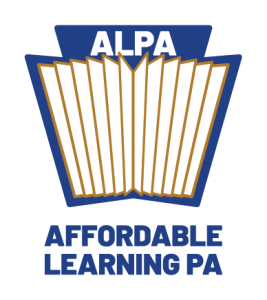The latest in our series of spotlights on local OER efforts, Pennsylvania demonstrates how volunteers can work together to promote affordable learning.
To get more faculty and students to embrace the use of Open Educational Resources in Pennsylvania, Steven Bell says there is power in collective action. The commonwealth has no legislative mandate or education funding for OER, so he helped coordinate a statewide network to advance the open agenda.
 Established in 2016, Affordable Learning Pennsylvania (ALPA) provides resources throughout the state on best OER practices. It operates with a multi-year Library Services Technology Act (LSTA) grant, but relies largely on volunteers to achieve its goal of creating greater access and equity in education.
Established in 2016, Affordable Learning Pennsylvania (ALPA) provides resources throughout the state on best OER practices. It operates with a multi-year Library Services Technology Act (LSTA) grant, but relies largely on volunteers to achieve its goal of creating greater access and equity in education.
“We are very much grassroots — started by librarians who saw the value of having a more sustainable initiative working together at the state level,” says Bell, associate university librarian for research and instructional services at Temple University in Philadelphia, who started ALPA in conjunction with the Pennsylvania Academic Library Consortium (PALCI).
The LSTA grant helps fund the network, which has formed connections with a variety of campuses. Any Pennsylvania state library can be a member of ALPA and participation is open. ALPA’s 70 campus partners include community colleges, small private institutions and large state universities. The network conducts an annual survey of the Campus Partners, the group’s representatives at each participating institution, to track progress on local initiatives for affordable learning and identify the needs of the membership. It also hosts an annual gathering, such as last year’s inaugural OER summit that drew more than 100 participants from across the state.
“It was a good way to inject the project with a lot of momentum and have people come together,” says Sarah Greene, director of the Pennsylvania State Library, “It energized everybody.”
This year’s summit was held virtually Sept. 9 through Sept. 25. A highlight of this year’s program was the addition of faculty and student panels. (SPARC’s Nicole Allen, Director of Open Education as a keynote speaker.) Initially composed primarily of librarians, ALPA is working to diversify its participants to include students and faculty. Although the dynamic shifts when an event is online, it reduces the travel barrier for participation for many who live in the geographically diverse and large state, notes Greene.
As OER expands in Pennsylvania, Bell says the messaging is evolving from just being about open books to emphasizing open pedagogy and learning. “We are gradually changing our perspective from only about saving money to the broader issue of social justice,” Bell says, “It’s also about faculty having more academic freedom, agency and resources to use for teaching.”
Alison Bradley, director of strategic initiatives at PALCI who oversees the LSTA grant, says the structure is an opportunity to distribute the work and engage a range of individuals. Nearly 40 volunteers are involved in the administration of ALPA, bringing a real passion and dedication to the activities.
“It’s a strength that we can draw on the breadth of the community experiences,” says Bradley, “When you look at grassroots organizations, you get real leadership and autonomy.”
ALPA has four active working groups. Three are charged to lead efforts with assessment and data; education and training; communication and outreach. A fourth group of OER specialists offer support for librarians, faculty and staff interested in developing OER initiatives on their home campuses.
Lauren Irvin, resource librarian at Point Park University in Pittsburgh, is chair of the OER specialists group, which consists of eight people serving for two years each. The group just had its annual retreat online where participants shared ideas for ways to develop programming for campus partners on OER advocacy.
“With everyone being remote, we are trying to remind people we are here, all working to the same goal and that they should not feel alone in their OER advocacy efforts,” Irvin says. Among the topics they focused on was developing webinars aimed at increasing the involvement of student government leaders in OER.
“ALPA has done a great job of building community, creating awareness and informing people of best practices,” Greene says. “We are making good strides with OER. We hope to move Pennsylvania to a place where OER is adopted to enhance and make education more equitable.”